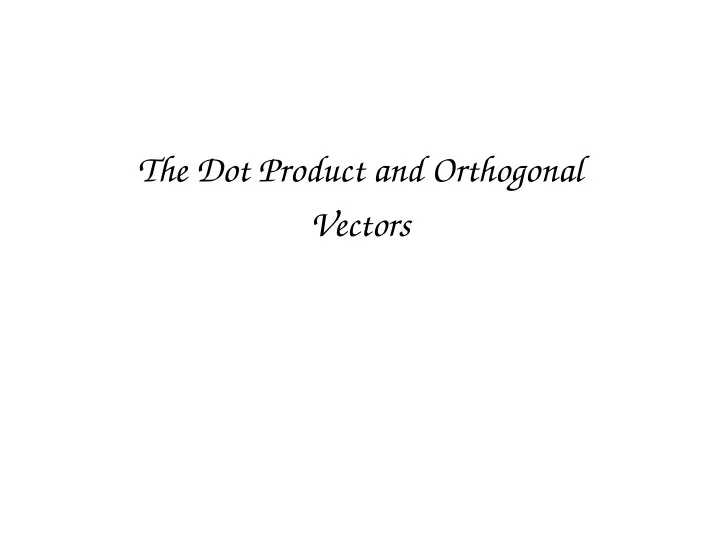

The Dot Product and Orthogonal Vectors
The Dot Product Defn. The dot product (or inner product ) of two vectors u and v denoted u · v is the sum of the product of corresponding entries That is � u · v = u i v i . i orthoONE: 2
Example Dot Product For example, 3 4 − 1 · 4 = 12 − 4 − 14 = − 6 . − 2 7 If we view the two vectors as matrices, then the dot product u · v is the entry in the 1 × 1 matrix given by u T v . orthoONE: 3
Dot Product is Well Behaved Several facts one could write. These include the distributive law : u · ( v + w ) = u · v + u · w orthoONE: 4
Dot Product and Orthogonal Vectors Defn. Two vectors are orthogonal if their dot product is zero. Orthogonal vectors are sometimes called per- pendicular vectors. orthoONE: 5
Norm of a Vector Defn. The length (or norm ) of vector v is || v || = √ v · v . A unit vector has length 1 . orthoONE: 6
Normalization ALGOR To obtain a unit vector in the same direction, divide by the length. √ For example, the vector (3 , − 1 , 2) has norm 14 ; 1 a unit vector in the same direction is √ 14 (3 , − 1 , 2) . orthoONE: 7
Pythagoras’ Theorem Fact. Pythagoras’ Theorem Vectors u and v are orthogonal if and only if || u + v || 2 = || u || 2 + || v || 2 . Proof is by computation. orthoONE: 8
Summary The dot product u and v of two vectors u · v is the sum of the product of corresponding entries. As matrices, the dot product is (the entry in) the matrix u T v . Two vectors are orthogonal if their dot product is zero. The length/norm of vector v is √ v · v . To obtain a unit vector in the same direction, divide by the length. Pythagoras’ Theorem is that u and v are orthog- onal if and only if || u + v || 2 = || u || 2 + || v || 2 . orthoONE: 9
Recommend
More recommend